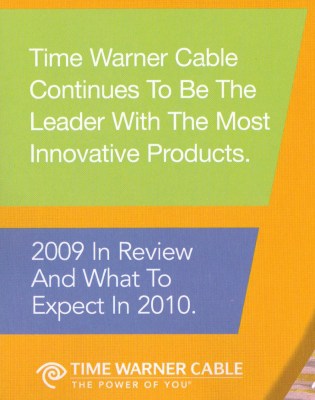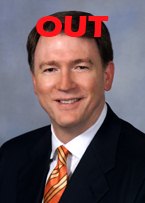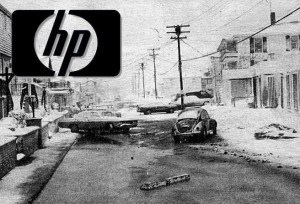
Last year's glossy mailer gave fair warning what subscribers could expect in 2010 were rate increases.
Time Warner Cable customers in several areas of the country are now receiving good tidings in their mailbox — the annual glossy mailer that portends the company’s annual “rate adjustments.”
Customers in areas from snowed-in western New York to fogged-in Los Angeles will find the company quick to congratulate themselves on their “achievements” in 2010 — achievements that someone has to pay for — you.
After you’ve finished reading all of the self-back-patting accolades, somewhere towards the bottom of the piece the company tries to break the bad news, telling you it must periodically “adjust prices.” We know what that means and so do you.
The company’s new rate schedule for 2011 delivers price increases across the board, but the exact amounts and percentages depend on where you live. For customers in western New York, expect around a 6 percent rate hike. In southern California, rates for just about everything are increasing, some by a percentage considered high even for the cable industry. The more services you bundle with the cable company, the less the total increase will bite your wallet.
Considering America’s inflation rate stands at less than 1 percent and will remain at that level through next year, a rate increase six times that amount is certain to start another round of package trimming and cord cutting from strapped subscribers.
“Everytime they increase their rates, I drop something to keep my bill manageable,” writes our reader David in Charlotte, N.C. Rate increases in that state were announced in November.
“When I’m down to just standard cable and Internet, I’ll look to drop them,” he adds.
David says he used to have a fully-loaded package from Time Warner, taking every premium channel, Digital Phone, and Road Runner Turbo. But not anymore.
“When they raised rates three years ago, we dropped several premium channels,” David said. “Two years ago we dropped the rest and some of their HD programming, and last year we chucked Digital Phone for our cell phone.”
What is going in 2011? Road Runner Turbo.
“It’s a pointless product ever since they raised upload speeds for standard Road Runner customers.”
For customers in Rochester, the latest rate hike is the latest of several over the past year. The company has been incrementally increasing prices on individual components of the cable package in an effort to drive more customers into bundled service packages.
 In Los Angeles, it’s much the same. Rate increases are on the way for DVR service and for set top boxes. So are dramatic price hikes for virtually anything requiring an employee to come to your home. Want them to pick up or exchange equipment? Pony up $29.99 (up 50 percent). Need someone to install your phone or Internet? That’s going up 65 percent to $32.99.
In Los Angeles, it’s much the same. Rate increases are on the way for DVR service and for set top boxes. So are dramatic price hikes for virtually anything requiring an employee to come to your home. Want them to pick up or exchange equipment? Pony up $29.99 (up 50 percent). Need someone to install your phone or Internet? That’s going up 65 percent to $32.99.
The company’s response to these increases?
The usual — programming cost increases. The company also encourages customers to do installations themselves and drop off equipment at a local cable store to avoid the charges.
Columnists are using the occasion to scream once again for a-la-carte cable — allowing customers to pick and pay for only the channels they want to receive, always a Dead-on-Arrival idea for cable companies.
Tom Joyce from the Mount Airy News noticed as rates increase, the channels he wants to see either aren’t on the system, are being dropped, or are at risk of being dropped because of contract disputes:
What really irks cable television subscribers is that not only are we paying more, we are getting less for our money as well. It would be one thing to simply charge subscribers more for the same service, but what Time Warner seems to be doing is hiking prices while also diminishing the quality of its programming.
For example, C-SPAN2 recently was dropped from the system. C-SPAN2 is a great outlet for public-affairs programming and also focuses on books written on government, history and similar topics.
While some TV watchers might say good riddance to such a high-brow channel, I think it’s a shame viewers now have one less outlet that might actually broaden their intellectual horizons or help them become better-informed citizens.
Yet Time Warner’s cuts also could affect mainstream broadcast content as well. There have been announcements that Channel 48, a Triad TV station, is being dropped from the local cable system at the end of this month. I rely on Channel 48 for many entertainment shows, including late-night reruns of “The Office.” This trend isn’t new. It’s been occurring over the years, paralleling a scenario of constant price increases.
The cable package I receive once included the Fox Movie Channel, Encore Westerns and others that I found enjoyable, but which gradually fell by the wayside. Only one bona fide movie selection remains, Turner Classic Movies.
Channels that I now receive basically are a collection of commercial-laden garbage and cheap filler.
David Lazarus at the LA Times agrees:
“I’ve said it before and I’ll say it again: Cable and satellite bills are too high, and it’s nuts that people have to pay through the nose for channels they never watch,” Lazarus writes. “It’s time for cable and satellite companies to switch to a la carte programming so we can start paying for products we actually want, rather than ones that we’re forced to accept.”
Lazarus also noticed Time Warner Cable’s efforts to placate subscribers with freebies backfired again this year as well:
As it did last year, Time Warner is again trying to make its annual rate hike more palatable by giving customers coupons to watch premium movies for just 99 cents.
The catch is that you have to mail in the coupon with your bill to have it redeemed. Or you can mail it separately if you want to add 44 cents in postage to your 99-cent movie.
But what about all those customers who have gone paperless — as Time Warner prefers — with automatic bill payments or electronic cash transfers? Isn’t this unfair to them?
When I suggested last year that maybe the cable giant should include a digital code on its coupons so that customers could redeem them online, a company spokeswoman said this was a good idea and she’d take it up with her superiors.
I suggested the same this year to Gordon. He said it was a good idea and he’d take it up with his superiors.


 Subscribe
Subscribe






